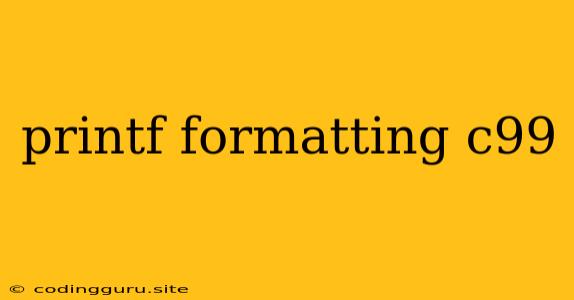Mastering printf Formatting in C99: A Comprehensive Guide
C99 introduced several enhancements to the C programming language, including improvements to the printf() function, a powerful tool for output formatting. Understanding how to use printf() effectively is essential for writing clear and readable code. This article will delve into the intricacies of printf() formatting in C99, providing a comprehensive guide to help you leverage its full potential.
The Basics of printf() Formatting
At its core, printf() allows you to display formatted output to the console. It uses a format string, which contains special characters called format specifiers, to control how different data types are printed.
Here's a simple example:
#include
int main() {
int age = 25;
char name[] = "John Doe";
printf("My name is %s and I am %d years old.\n", name, age);
return 0;
}
This code will print the following output:
My name is John Doe and I am 25 years old.
Let's break down the format string:
- %s: This specifier represents a string. It will be replaced with the value of the
namevariable. - %d: This specifier represents an integer. It will be replaced with the value of the
agevariable. - \n: This is a newline character, which moves the cursor to the next line.
Understanding Format Specifiers
C99 provides a wide range of format specifiers, each designed for a specific data type:
| Specifier | Data Type | Description |
|---|---|---|
| %c | char | Character |
| %d | int | Signed decimal integer |
| %i | int | Signed decimal integer (same as %d) |
| %u | unsigned int | Unsigned decimal integer |
| %f | float | Floating-point number (decimal) |
| %e | float | Floating-point number in scientific notation |
| %g | float | Floating-point number in either decimal or scientific notation, whichever is shorter |
| %p | void* | Pointer address |
| %s | char* | String |
| %x | int | Unsigned hexadecimal integer |
| %X | int | Unsigned hexadecimal integer (uppercase) |
| %o | int | Unsigned octal integer |
Customizing Output with Flags and Modifiers
C99 offers additional options to control the output further:
Flags:
- -: Left-justify the output within the field width.
- +: Forces the display of a sign (+ or -) for signed values.
- space: Displays a space for positive signed values.
- 0: Pads the output with zeros instead of spaces.
- #: Used for alternative output forms (e.g., 0x prefix for hex numbers).
Modifiers:
- h: Applies to
short int,short unsigned int, orchar. - l: Applies to
long int,long unsigned int,long double, ordouble. - L: Applies to
long double. - j: Applies to
intmax_tanduintmax_t. - z: Applies to
size_tandssize_t. - t: Applies to
ptrdiff_t.
Field Width:
You can specify the minimum field width using an integer after the percentage sign. The output will be padded with spaces if it's shorter than the specified width.
Precision:
For floating-point numbers, you can control the number of digits displayed after the decimal point by adding a period (.) followed by an integer after the specifier.
Examples:
int age = 25;
float price = 19.99;
char initial = 'J';
printf("%10d\n", age); // Output: 25
printf("%-10d\n", age); // Output: 25
printf("%.2f\n", price); // Output: 19.99
printf("%+d\n", age); // Output: +25
printf("%#x\n", age); // Output: 0x19
printf("%c\n", initial); // Output: J
Advanced Formatting Techniques
Field Width as an Expression:
You can use an expression to dynamically determine the field width. For example:
int num = 123;
int width = 10;
printf("%*d\n", width, num); // Output: 123
Printing Arrays with printf():
While printf() doesn't directly handle arrays, you can use a loop to print each element:
int numbers[] = {1, 2, 3, 4, 5};
int size = sizeof(numbers) / sizeof(numbers[0]);
for (int i = 0; i < size; i++) {
printf("%d ", numbers[i]);
}
printf("\n");
Printing Strings with Limited Length:
You can limit the number of characters printed from a string:
char str[] = "Hello World!";
printf("%.5s\n", str); // Output: Hello
Common Mistakes and Best Practices
- Mismatch between Specifier and Argument Type: Using the wrong specifier for a data type can lead to unexpected output or even crashes. Always ensure that the specifier matches the argument's type.
- Missing Arguments: If you have a format specifier in your string but don't provide a corresponding argument, the behavior is undefined. This is a common source of errors.
- Unintended Padding: Be mindful of how flags and field width affect the spacing of your output. Use them judiciously to enhance readability.
- Excessive Formatting: While
printf()provides a lot of flexibility, avoid overly complex formatting that makes your code difficult to understand.
Conclusion
Mastering printf() formatting in C99 is essential for any C programmer. Understanding format specifiers, flags, modifiers, and advanced techniques empowers you to create clean, readable, and informative output. By following best practices and avoiding common pitfalls, you can leverage the full power of printf() for your C programming endeavors.
